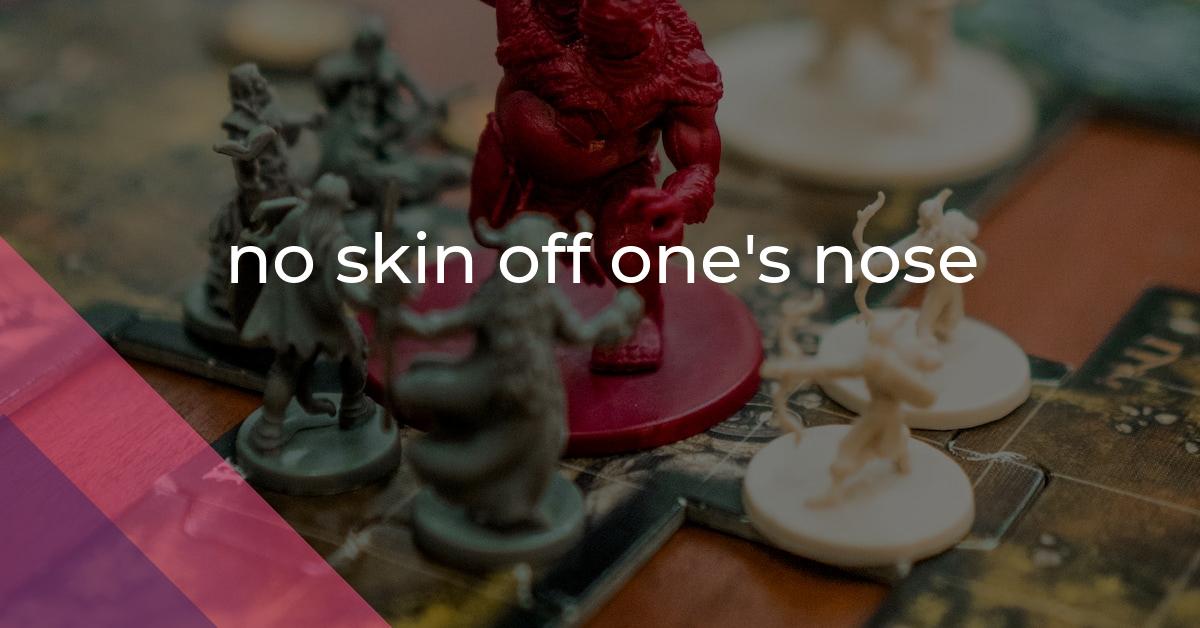no skin off one’s nose: Idiom Meaning and Origin
What does ‘no skin off one's nose’ mean?
The idiom "no skin off one's nose" means that something does not affect or bother someone, or that they are not personally affected by a situation or outcome. It implies that the person has no reason to be concerned or worried about the matter.

Idiom Explorer
The idiom "save someone's skin" means to rescue or protect someone from danger or harm.
The idiom "rub off on" means to influence or have an impact on someone, typically in terms of their behavior, attitude, or habits.
The idiom "poke one's nose into" means to interfere in someone else's business or affairs without being invited or asked to do so.
The idiom "off the hook" means to no longer be responsible or obligated for something, usually because someone else has taken over or the situation has been resolved.
The idiom "not to put too fine a point on it" means to say something without being overly precise or explicit, typically to avoid causing offense or discomfort.
The idiom "nothing to it" means a task or activity that is easy or simple to do.
The idiom "no soap" means that something is not possible or not going to happen. It can also mean that someone's efforts or attempts have failed. This idiom is informal and is often used in casual conversations.
The idiom "no skin off one's back" means that something does not affect or bother someone at all. It implies that the person is not personally affected or harmed by a situation or action.
The idiom "nose out of joint" means to be upset or offended by a slight or snub. It refers to feeling a sense of injury or annoyance when someone or something disrupts our expectations or status quo.
Implications Unveiled
No skin off one's nose is an idiomatic expression that means a particular action or situation does not have any negative consequences for the person being referred to. It conveys a sense of indifference or nonchalance towards the matter at hand. Similar idioms include no skin off one's back, like water off a duck's back, it's none of your business, no harm, no foul, and none of someone's business.
There are different theories regarding the origin and etymology of this idiom, but none of them can be confirmed. One theory suggests that it may have originated from boxing, where a punch that doesn't land on the opponent's face doesn't cause any physical harm or damage. Another theory proposes that it may have derived from the practice of applying Lanolin to the nose of horses during winter to protect them from drying out. This practice would imply that if no skin is on one's nose, it means that one is not directly affected or harmed by a situation.
However, the exact origins and meaning of no skin off one's nose remain uncertain. It is a phrase that has become ingrained in the English language but its etymology and usage evolution are difficult to pinpoint. The idiom is primarily used in casual conversation and is not typically employed in formal or professional settings. It finds use in a wide range of contexts, expressing indifference or lack of concern towards various situations.
For instance, "no skin off one's back" is another idiom that means a situation or action doesn't negatively impact someone. It shares a similar meaning to no skin off one's nose, emphasizing that there are no adverse consequences for the person involved. Whether it's no skin off one's nose or no skin off one's back, the underlying idea is that the person remains unaffected by the situation.
Another related idiom is "like water off a duck's back." This phrase suggests that criticism or negative comments have no effect on a person. Just as water slides right off a duck's feathers without soaking in, negative feedback doesn't penetrate or bother the person being referred to. It shares a sense of indifference with no skin off one's nose.
Additionally, "it's none of your business" is an idiom that conveys the idea that something is not the concern of the person being addressed. It implies that the matter under discussion is personal or private and does not involve or affect the person who is being told that it's none of their business. It shares a notion of indifference and lack of concern with the idiom no skin off one's nose.
Another relevant phrase is "no harm, no foul." This idiom means that if no harm or damage has been caused, then there is no need for any punishment or consequence. It suggests that if no negative consequences have occurred, there is no reason to worry or be concerned. It resonates with the idea behind no skin off one's nose, emphasizing the absence of adverse outcomes or repercussions.
Yet another related expression is "none of someone's business." This phrase communicates that a particular matter is not the concern or affair of the person being referred to. It conveys a sense of indifference towards the situation at hand, just like no skin off one's nose. It implies that the person is not directly affected or involved, and therefore, it is not their business to be concerned with it.
No skin off one's nose is an idiom that has been in use for over a century. While its exact origins and meaning remain elusive, it is commonly used in everyday language to express indifference or lack of concern towards a particular matter. Despite its ubiquity, the idiom continues to intrigue and puzzle both language enthusiasts and etymology experts, leaving open the possibility of further exploration and discovery in the future.
Example usage
Examples of how the idiom *no skin off one's nose* can be used in a sentence:
- 1. "I offered to pay for dinner, but he declined, saying it was no skin off his nose."
- 2. "She didn't mind if her friends went out without her; it was no skin off her nose."
- 3. "The team lost the game, but it was no skin off their nose as they had already secured a place in the playoffs."
More "Expression" idioms



